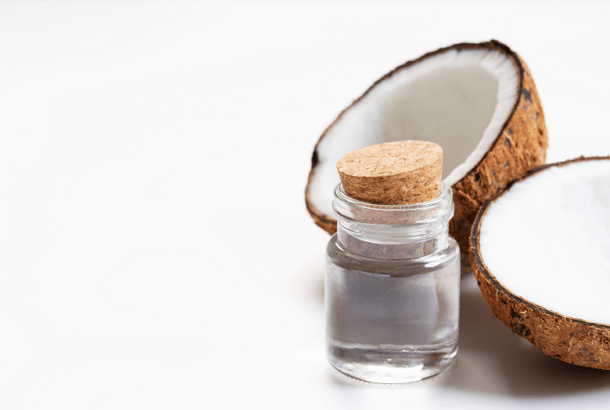In the ever-evolving realm of beauty, the resurgence of natural and organic skincare remedies has taken the world by storm. Among the plethora of ingredients, one particular marvel stands out: coconut oil. Extracted from the kernels of mature coconuts, this versatile elixir has transcended its kitchen origins to become a beauty staple. Prepare to embark on a journey through the realm of coconut oil, as we delve into the myriad benefits of coconut oil for face, supported by scientific evidence. Brace yourself to uncover the secrets of this natural wonder and embrace a radiant complexion.
Understanding of Coconut Oil

Unraveling the Complex Composition
Within the depths of coconut oil lies a symphony of saturated fats, lending it a solid form at room temperature. These fats, such as lauric acid, capric acid, and caprylic acid, harmoniously blend to create their unique profile. But that’s not all! Coconut oil boasts a treasure trove of antioxidants, vitamins, and minerals, including vitamins E and K, iron, and calcium.
The Extraction Expedition
Through meticulous methods like cold-pressing and centrifugation, coconut oil emerges victorious from its extraction journey. The beauty lies in the process—cold-pressed coconut oil reigns supreme, preserving its inherent benefits by minimizing heat exposure.
Unleashing the Delights of Coconut Oil for Your Face

1. Moisturizing & Hydrating
Prepare for an oasis of hydration as coconut oil, armed with its abundance of fatty acids, becomes a benevolent moisturizer for your face. Witness the transformation as it weaves a protective shield, minimizing water loss and maximizing hydration. Escape to dry skin and embrace the softness that takes place. A special treat for those with dry or sensitive skin.
2. Anti-Aging
Immerse yourself in the realm of aging. Witness the magic of antioxidants within coconut oil as they join forces with collagen production, leading to a formidable anti-aging alliance. Bid farewell to fine lines, wrinkles, and age spots as you bask in the radiance that only coconut oil can unveil. Prepare to be captivated by its natural emollient powers, weaving a tapestry of youthfulness across your face.
3. Battle Against Acne
Brace yourself for a paradigm shift, for coconut oil has a surprising role to play in the realm of acne-prone skin. Defying conventional wisdom, its antimicrobial properties embark on a valiant quest against the dreaded acne-causing bacteria. Yet, heed the warning, for this journey requires caution. Coconut oil, while a mighty warrior, can, in some cases, clog pores. Test the waters with a patch test and tread lightly, incorporating it judiciously into your skincare regimen.
4. Soothing and Calming
Breathe in tranquility as coconut oil serenades your skin with its anti-inflammatory prowess. Soothe the troubled waters of eczema, psoriasis, or sunburn as this gentle guardian nurtures and heals. Allow its caress to alleviate irritation, unveiling a canvas of calmness.
5. Makeup Extractor
Prepare to be charmed by the harmonious symphony of coconut oil as it takes center stage in your makeup removal routine. Witness its emollient cadence gracefully dissolve even the most stubborn makeup, bidding farewell to waterproof barricades. Embrace the simplicity as you gently massage coconut oil onto your face, allowing its magic to unfold. Finally, a warm washcloth wipes away the residue, leaving behind a face both cleansed and nourished.
The Art of Incorporating Coconut Oil into Your Skincare Routine

1. The Cleansing Concoction
Embark on a cleansing escapade, embracing the art of oil cleansing. Cover your face in a sensuous squeeze of coconut oil, as impurities, dirt, and excess oil give in to its prowess. Revel in the delicate ballet of circular motions before the final act—a warm, damp cloth whisking away the remnants. Witness the balance restored as your skin’s natural oil production finds harmony, with hydration as its ally.
2. Coconut Oil Face Masks
Unleash your inner alchemist as you concoct homemade face masks, blending coconut oil with honey, turmeric, or aloe vera gel. Start on a 15-20 minute interval, allowing this composition of excellence to grace your face. Observe the depths of hydration, the charm of exfoliation, and the nourishment that covers your skin. Prepare to be happy with the masterpiece that unfolds.
3. Spot Treatment for Blemishes
Enter the world of precision as you embark on a gentle dance with coconut oil. Pat a small amount onto blemishes and acne scars, igniting the healing process with passion. Testify the enchantment as its antimicrobial and anti-inflammatory properties join forces, calming redness and accelerating skin recovery. A captivating performance to restore confidence.
The Pros and Cons of Using Coconut Oil for Face
Due to its all-natural qualities and possible advantages, coconut oil has received considerable attention in the cosmetics industry. Before introducing coconut oil into your beauty routine, you should weigh the benefits and drawbacks, just as with any other skincare product. Let’s explore the benefits and shortcomings of this well-liked beauty tonic.
Pros
- Antimicrobial Agent
Lauric acid, which is a component of coconut oil, has antibacterial characteristics that can help fight off some bacteria, fungi, and viruses. As a result, treating skin diseases like fungal infections or acne may be possible.
- Skin Barrier Support
Coconut oil contains saturated fats that can help to enhance the skin’s defenses. Retaining moisture aids in preventing water loss and protects the skin against aggressors on the outside, such as pollution or bad weather.
Cons
- Comedogenic Concerns
Given its propensity to block pores, coconut oil is thought to be extremely comedogenic. For people with oily or acne-prone skin, this may be troublesome because it could aggravate breakouts or cause the development of blackheads and whiteheads.
- Individual Sensitivity
Although most people tolerate coconut oil well, some people may have allergic reactions or unpleasant reactions. Before using coconut oil on larger regions of the skin, it is essential to conduct a patch test to establish compatibility and prevent potential irritation.
- Sun Sensitivity
Coconut oil doesn’t provide much protection from the sun. In fact, because of its occlusive properties, which could trap heat in the skin, it could potentially make people more sensitive to the sun. If sun exposure is foreseen, it is imperative to use coconut oil with sunscreen with an appropriate SPF.
Who Should Not Use Coconut Oil?
Although coconut oil has become famous as a versatile skincare solution, it’s vital to remember that some people should use it with caution or never. Coconut oil may worsen breakouts or make oily skin greasy for people with acne-prone skin. Before introducing coconut oil into their routine, people with sensitive skin or a history of allergies should be cautious and perform patch tests.
Also, coconut oil is not recommended for people who spend a lot of time in the sun because it offers little protection from the sun and may even make them more sensitive to it. It’s essential to think about these aspects and make a knowledgeable choice based on your particular skin type and needs.
FAQs
Is coconut oil suitable for all skin types?
While coconut oil can be beneficial for many individuals, it may not be suitable for everyone. Those with acne-prone or oily skin should exercise caution, as it can potentially clog pores and exacerbate breakouts. Patch testing is recommended for individuals with sensitive skin or a history of allergies to ensure compatibility.
Is there scientific evidence supporting the benefits of coconut oil for skincare?
While anecdotal evidence suggests various benefits of coconut oil for the skin, scientific research on its specific effects is limited. Results may vary depending on individual skin types and conditions. It’s important to manage expectations and consult with a skincare professional for personalized advice.
Can coconut oil help reduce the appearance of wrinkles and fine lines?
Coconut oil contains antioxidants and can enhance collagen production, making it a potential ingredient for reducing the appearance of wrinkles and fine lines.
Can coconut oil be used as a lip balm?
Yes, coconut oil can serve as a natural lip balm, providing hydration and nourishment to dry or chapped lips. Its moisturizing properties can help soften and restore the lips’ natural suppleness. Applying a small amount of coconut oil to the lips can offer a gentle and organic lip care solution.
Are there any potential allergic reactions to coconut oil?
While allergic reactions to coconut oil are rare, individuals with coconut allergies may experience adverse effects.
The Bottom Line
Coconut oil has gained recognition as a natural and versatile solution for promoting radiant and healthy skin. Its moisturizing and hydrating properties, along with its potential anti-aging and soothing effects, make it a valuable addition to skincare regimens.
However, it’s important to consider individual factors like skin type, allergies, and specific skin concerns when incorporating coconut oil into your routine. Using them in moderation is essential to ensure compatibility and minimize any potential adverse reactions. While coconut oil offers numerous benefits, it may not be suitable for everyone, especially those with acne-prone or oily skin.
Additionally, it’s crucial to note that coconut oil should not be used as a substitute for sunscreen. By understanding the benefits, limitations, and proper usage of coconut oil for face, individuals can make informed decisions to harness its full potential and experience the transformative effects it can have on their skin. Embrace the natural wonders of coconut oil and allow your face to radiate a healthy and luminous glow.


Comments are closed.